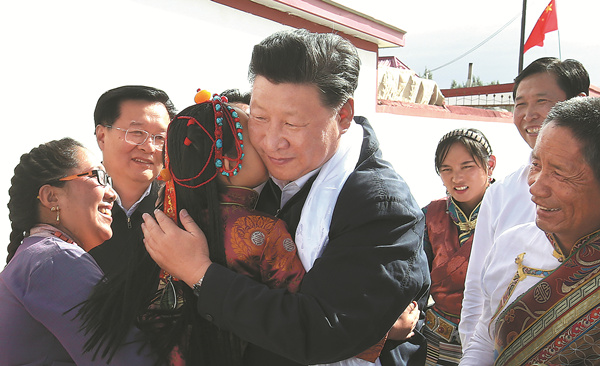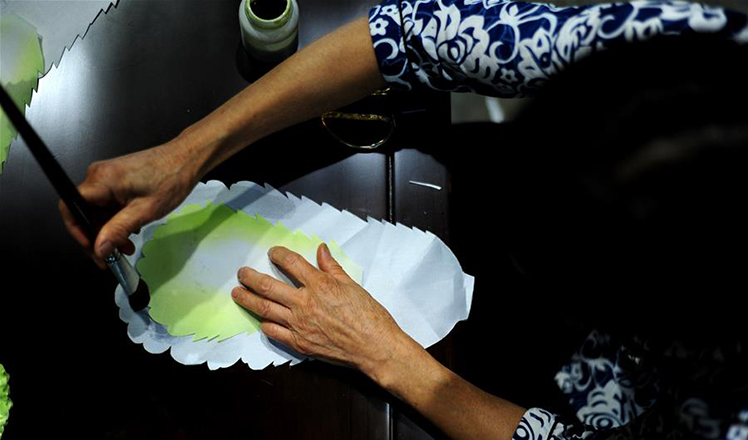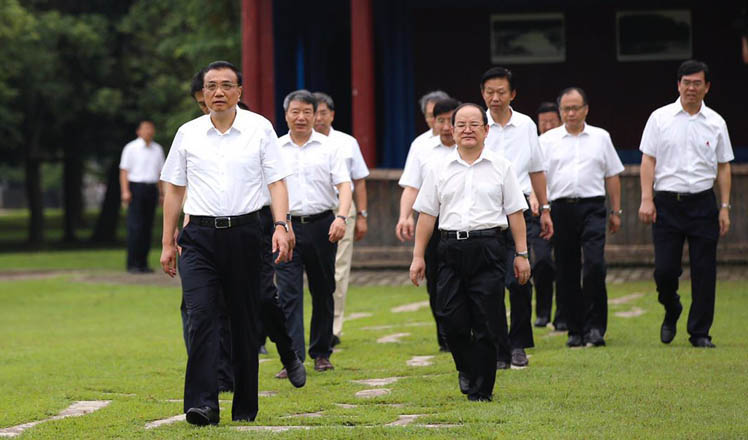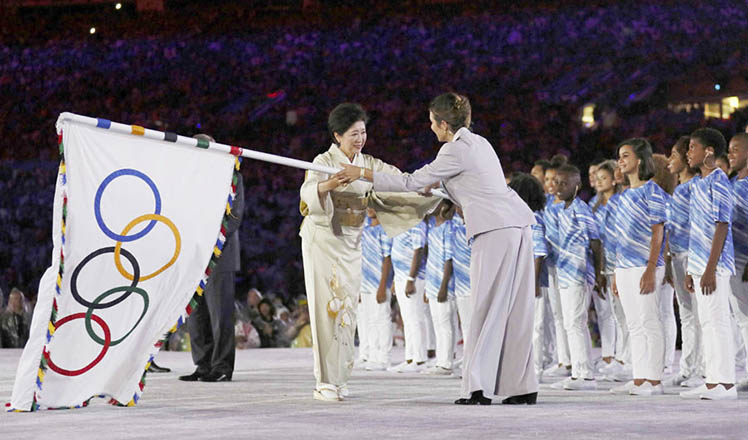Xi: Natural resources must be safeguarded
Updated: 2016-08-24 02:47
By AN BAIJIE(China Daily)
|
||||||||
 |
|
President Xi Jinping hugs 5-year-old Tseyang Lhamo while visiting Tibetan ethnic villagers in Qinghai province onMonday. PANG XINGLEI / XINHUA |
Restricting the exploitation of natural resources in the ecology-fragile Qinghai-Tibetan Plateau is good for economic development, President Xi Jinping said on Tuesday during an inspection tour.
Protecting the ecological environment of the Sanjiangyuan area, known as "China's water tower", is vital for the nation's development, Xi said.
The ecological system is fragile in Qinghai, especially in the Sanjiangyuan area, where the headwaters of the Yangtze, Yellow and Lancang (known as the Mekong outside China) rivers are located.
The area is home to more than 2,200 types of wild plants, 85 animal species and more than 230 kinds of birds. Since the late 20th century, the lakes there have shrunk as a result of human activities and overgrazing.
During a tour of the plateau on Monday, Xi said ecological protection must be made a top priority in exploiting natural resources.
At the Qarhan Salt Lake in Qinghai province, he told the local government to draw up a proper strategy for natural resources and set an example for the nation in correctly exploiting them.
Xi visited a potash fertilizer company's yard near the lake, where he was briefed on the firm's production, sales and technological upgrading.
On Monday afternoon, Xi visited a Tibetan ethnic family in Tanggula, a township in Sanjiangyuan. The villagers presented whitehada(silk scarves) to the president to show their respect.
Hearing that local people's livelihoods had been improved with better housing and home appliances, Xi told them they would continue to have happy lives and wished them good health.
Poverty relief work has been a prominent feature of Xi's domestic tours.
On Tuesday morning, he visited a newly built village in Haidong, Qinghai, where the residents have just been relocated from their shanty huts in the remote mountainous region. The huts had no running water.
In late 2012, during his first inspection tour after becoming general secretary of the Communist Party of China Central Committee, he visited a poor village in Hebei province and presented the villagers with relief materials such as cooking oil, quilts and winter coats.
During a tour last month of the Ningxia Hui autonomous region, an underdeveloped area with a high concentration of ethnic groups, Xi said: "There are still some 50 million Chinese struggling with poverty, and by 2020 they must all be lifted out of poverty. This is my top concern now."
anbaijie@chinadaily.com.cn
Zhang Yaozhong contributed to this story.
- China, Japan, S. Korea should work to make differences controllable
- Several killed after strong quake strikes Italy, topples buildings
- FM's Tokyo trip to help set trilateral G20 cooperation tone, source says
- DPRK's renovated central zoo attracts thousands of visitors every day
- Canadian PM to visit China
- UN Security Council slams deadly terrorist attack in Turkey

 Top 5 smartwatches in customer satisfaction
Top 5 smartwatches in customer satisfaction
 Woman creates silk Chinese cabbage
Woman creates silk Chinese cabbage
 Panda family celebrate birthday in Malaysia
Panda family celebrate birthday in Malaysia
 Life of an underwater photographer
Life of an underwater photographer
 Lakers confirms Yi Jianlian's signing
Lakers confirms Yi Jianlian's signing
 Premier Li pays homage to Red Army martyrs
Premier Li pays homage to Red Army martyrs
 'Born in China' in Chinese paintings
'Born in China' in Chinese paintings
 Goodbye, Rio; hello, Tokyo
Goodbye, Rio; hello, Tokyo
Most Viewed
Editor's Picks

|

|

|

|

|

|
Today's Top News
Trump outlines anti-terror plan, proposing extreme vetting for immigrants
Phelps puts spotlight on cupping
US launches airstrikes against IS targets in Libya's Sirte
Ministry slams US-Korean THAAD deployment
Two police officers shot at protest in Dallas
Abe's blame game reveals his policies failing to get results
Ending wildlife trafficking must be policy priority in Asia
Effects of supply-side reform take time to be seen
US Weekly

|

|







